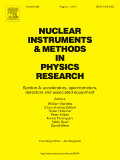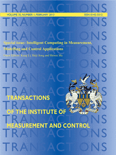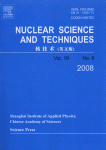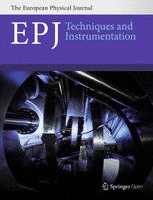
Journal of Instrumentation
Scope & Guideline
Connecting researchers to the pulse of instrumentation advancements.
Introduction
Aims and Scopes
- Instrumentation Development:
Research articles that present new technologies or improvements in existing instrumentation systems, including detectors, readout systems, and signal processing techniques. - Application in High-Energy Physics:
Papers that explore instrumentation used in particle physics experiments, including design and operational studies related to detectors at particle accelerators and collider experiments. - Radiation Detection and Dosimetry:
Studies focused on the development and characterization of detectors for measuring various types of radiation, including gamma, neutron, and charged particle detection. - Medical Imaging Technologies:
Research on the application of instrumentation in medical imaging, including advancements in PET, CT, and other imaging modalities. - Computational Methods in Instrumentation:
Articles that utilize simulations, machine learning, and data analysis techniques to enhance the performance and reliability of instrumentation systems. - Interdisciplinary Applications:
Papers that apply instrumentation technologies to fields outside traditional high-energy physics, such as environmental monitoring, nuclear safety, and industrial applications.
Trending and Emerging
- Machine Learning and AI in Instrumentation:
An increasing number of articles explore the integration of machine learning and artificial intelligence in data analysis, signal processing, and detector calibration, enhancing the efficiency and accuracy of instrumentation. - Advanced Imaging Techniques:
Research on high-resolution and multi-modal imaging systems is trending, particularly in the context of medical applications and high-energy physics, reflecting the demand for better diagnostic tools. - Novel Materials for Detectors:
There is a significant rise in studies focusing on the development and application of new materials, such as organic semiconductors and nanostructured materials, in the design of advanced detectors. - Real-Time Data Acquisition Systems:
The push for faster and more efficient data acquisition systems is evident, with an emphasis on real-time processing capabilities to support high-rate experiments. - Environmental and Safety Monitoring Systems:
Research on instrumentation for environmental monitoring, radiation safety, and nuclear security is gaining more attention, highlighting the importance of instrumentation in public safety and environmental protection.
Declining or Waning
- Traditional Radiation Detection Techniques:
There is a noticeable decrease in publications focusing on older radiation detection technologies, as research increasingly shifts towards novel materials and methods that offer better performance and sensitivity. - Basic Signal Processing Techniques:
Simple signal processing methods are being overshadowed by advanced machine learning approaches and complex algorithms, leading to a decline in interest in traditional techniques. - Low-Resolution Imaging Systems:
Research focusing on low-resolution imaging technologies is less frequent as the field moves towards higher resolution and more sophisticated imaging systems that utilize advanced detection methods. - General Purpose Detectors:
The journal sees fewer articles on general-purpose detectors as the focus shifts towards specialized detectors tailored for specific applications in high-energy physics and medical imaging. - Manual Calibration Methods:
The traditional methods of manual calibration for detectors are becoming less common, with automated and AI-driven calibration processes taking precedence.
Similar Journals

Geoscientific Instrumentation Methods and Data Systems
Advancing Earth Sciences through Innovative Instrumentation and Data SystemsGeoscientific Instrumentation Methods and Data Systems, published by COPERNICUS GESELLSCHAFT MBH, is a distinguished open-access journal dedicated to the dissemination of innovative methodologies, advanced instrumentation, and comprehensive data systems in the earth sciences. With an ISSN of 2193-0856 and an E-ISSN of 2193-0864, this journal has been paving the way for insightful research since its inception in 2012. Based in Germany, it serves a global audience interested in atmospheric science, geology, and oceanography, reflected in its impressive Scopus rankings and recent categorizations as Q2 and Q3 in these vital fields. The journal’s mission is to foster interdisciplinary collaboration and facilitate knowledge exchange, providing a platform for researchers and professionals to share significant advancements and challenge the frontiers of geoscientific instrumentation and methods. As an open-access journal, it ensures that pivotal research findings are accessible to a wider audience, promoting inclusivity and rapid dissemination of knowledge critical to addressing global challenges in earth and planetary sciences.

EUROPEAN PHYSICAL JOURNAL A
Fostering Global Dialogue in Nuclear and High Energy PhysicsEUROPEAN PHYSICAL JOURNAL A (EPJ A), published by Springer, is a premier journal in the field of Nuclear and High Energy Physics, dedicated to fostering innovative research and scholarly communication within the scientific community. With an impressive impact factor that reflects its significant contribution to the discipline, EPJ A ranks in the Q1 category and boasts a Scopus rank of 24 out of 87, placing it in the 72nd percentile of its field for 2023. This journal, with its ISSN 1434-6001 and E-ISSN 1434-601X, embraces a commitment to open access, ensuring that cutting-edge research is accessible to a global audience. With coverage from 1998 to 2024, EPJ A continues to be a vital resource for researchers, professionals, and students alike, promoting collaboration, knowledge sharing, and advancements in the vast landscape of nuclear physics and high-energy interactions. Located in Germany with a representative address in New York City, this journal serves as a bridge for international scientific discourse.

Frontiers in Physics
Connecting Ideas, Bridging Disciplines in PhysicsFrontiers in Physics is a prestigious peer-reviewed journal published by FRONTIERS MEDIA SA, dedicated to advancing the field of physics through innovative research and interdisciplinary approaches. Established as an Open Access journal in 2013, it has quickly become a vital resource for researchers, professionals, and students alike, with a shining presence in Scopus categories such as Biophysics, Materials Science, Mathematical Physics, and Physical Chemistry. With an impressive array of quartile rankings, including Q2 in several key areas, it positions itself firmly among leading journals in the field, reflecting its commitment to high-quality contributions. The journal's global reach and emphasis on collaborative research not only enhance its visibility in the scientific community but also facilitate a deeper understanding of complex physical phenomena. Researchers are encouraged to submit original works that push the boundaries of knowledge, making Frontiers in Physics an essential platform for the latest advancements in the discipline.

NUCLEAR INSTRUMENTS & METHODS IN PHYSICS RESEARCH SECTION A-ACCELERATORS SPECTROMETERS DETECTORS AND ASSOCIATED EQUIPMENT
Innovating detection and measurement in high energy physics.NUCLEAR INSTRUMENTS & METHODS IN PHYSICS RESEARCH SECTION A is a leading journal published by Elsevier, dedicated to the advancements in accelerators, spectrometers, detectors, and associated equipment relevant to the fields of nuclear and high energy physics. With its ISSN 0168-9002 and E-ISSN 1872-9576, this journal fosters knowledge sharing among physicists and researchers globally, providing a critical platform for both theoretical and experimental studies. Currently ranked in the Q2 quartile for both Instrumentation and Nuclear and High Energy Physics, the journal maintains a robust position in the competitive Scopus rankings, with noteworthy placements that underline its scholarly impact. As of 2023, it occupies the 38th rank in Nuclear and High Energy Physics and the 79th in Instrumentation, illustrating its relevance in the scientific community. Covering research spanning from its inception in 1983 to the projected completion in 2024, the journal caters to a diverse audience of researchers, professionals, and students eager to stay abreast of the latest innovations and techniques in the realm of nuclear instrumentation. Although it primarily operates under subscription-based access, it is instrumental in disseminating pivotal findings and experimental methodologies that drive progress in the scientific community.

TRANSACTIONS OF THE INSTITUTE OF MEASUREMENT AND CONTROL
Elevating Standards in Measurement and Control ResearchTRANSACTIONS OF THE INSTITUTE OF MEASUREMENT AND CONTROL, published by SAGE Publications Ltd, is a prestigious journal that has been at the forefront of research in measurement and control since its inception in 1979. With its ISSN 0142-3312 and E-ISSN 1477-0369, this UK-based journal is indexed in reputable databases, showcasing its impact in the field, highlighted by a notable Q2 ranking in Instrumentation for 2023. The journal serves as a vital platform for scholars and practitioners alike, publishing high-quality, peer-reviewed articles that span a range of topics related to measurement technology and control systems. With an increasing focus on interdisciplinary approaches, TRANSACTIONS OF THE INSTITUTE OF MEASUREMENT AND CONTROL strives to advance the understanding and application of innovative measurement and control methodologies, making it an essential resource for academics, industry professionals, and students aiming to enhance their knowledge and expertise in this dynamic field. Although it operates under a traditional subscription model, the journal's commitment to disseminating cutting-edge research remains unwavering, inviting contributions that push the boundaries of instrumentation and control science.

INSTRUMENTS AND EXPERIMENTAL TECHNIQUES
Transforming Ideas into Experimental ExcellenceINSTRUMENTS AND EXPERIMENTAL TECHNIQUES is a renowned academic journal dedicated to the field of instrumentation and experimental methodologies within physics and engineering. Published by MAIK NAUKA/INTERPERIODICA/SPRINGER, this journal serves as a vital platform for disseminating innovative research findings, detailed experimental techniques, and advancements in instrumentation technologies. Operating since its inception in 1968, it has established itself as a reputable source for scholars and industry professionals, though it currently holds a category quartile ranking of Q4 in Instrumentation based on the 2023 metrics. With an ISSN of 0020-4412 for print and E-ISSN of 1608-3180 for electronic formats, the journal is accessible to a global audience, offering crucial insights that can lead to significant advancements in experimental approaches across various scientific domains. Despite a current Scopus ranking placing it in the lower percentile, the journal continues to contribute to the ongoing discussions and developments in instrumentation, making it an essential read for researchers, professionals, and students eager to enhance their knowledge and expertise in this specialized area.

Nuclear Science and Techniques
Empowering Discoveries in Nuclear Physics and EnergyNuclear Science and Techniques is a distinguished peer-reviewed journal published by Springer Singapore Pte Ltd, dedicated to advancing the fields of nuclear science and engineering. With an impressive impact factor reflected in its 2023 quartile rankings—Q2 in Nuclear and High Energy Physics and Q1 in Nuclear Energy and Engineering—the journal serves as a vital resource for researchers, professionals, and students alike. Covering a breadth of topics from nuclear physics to energy applications, it offers a platform for innovative research and developments in the nuclear domain. The journal, indexed under ISSN 1001-8042 and E-ISSN 2210-3147, aims to foster scientific exchange and collaboration within the community by publishing high-quality articles that contribute significantly to the field. Committed to maintaining an open-access ethos, it enhances visibility and accessibility of critical knowledge, making it an essential source for current insights and trends in nuclear science.

ACS Measurement Science Au
Exploring New Horizons in Spectroscopy and ElectrochemistryACS Measurement Science Au, published by the American Chemical Society, is a leading open-access journal that has been at the forefront of measurement science since its inception in 2021. With its strong impact and esteemed reputation in the field, the journal has achieved impressive Scopus rankings, including Q1 in Analytical Chemistry and Q2 in Electrochemistry, reflecting its commitment to high-quality research and innovation. As a vital resource for researchers, professionals, and students alike, ACS Measurement Science Au covers a broad scope encompassing advanced measurement techniques across various domains, including spectroscopy and electrochemistry. With its open-access model, the journal ensures that cutting-edge research is readily available to the global scientific community, supporting collaboration and knowledge sharing. By fostering discussions that bridge different disciplines within measurement science, this journal plays a crucial role in advancing the forefront of analytical methods and instrumentation.

EPJ Techniques and Instrumentation
Transforming measurement science with collaborative insights.EPJ Techniques and Instrumentation is a leading journal published by Springer that focuses on advancing the field of instrumentation and measurement techniques across various disciplines. With a commitment to open access since 2014, this journal ensures that the latest research is freely available to academics, providing an inclusive platform for the dissemination of innovative methodologies and technological advancements. The journal serves as an essential resource for researchers, professionals, and students dedicated to the development and application of cutting-edge techniques in their respective fields. While the journal's scope encompasses a wide range of topics, it consistently encourages interdisciplinary collaboration and the exchange of ideas. As a cornerstone publication in the scientific community, EPJ Techniques and Instrumentation is poised to impact the trajectory of future research, fostering a deeper understanding and better utilization of instrumentation in scientific inquiry.

TECHNICAL PHYSICS
Illuminating the Path of Technical Physics ResearchTECHNICAL PHYSICS, published by PLEIADES PUBLISHING INC, is a prestigious journal that has been serving the scientific community since its inception in 1996. With a focus on the diverse realms of physics and astronomy, this journal is committed to publishing pioneering research that spans various aspects of theoretical and applied physics. Though currently categorized in the Q3 quartile for the year 2023, TECHNICAL PHYSICS holds considerable merit with a Scopus ranking of #56 out of 81 in its field, positioning it within the 31st percentile. The journal aims to provide a platform for researchers, professionals, and students to disseminate their findings and foster collaboration within the global physics community. While it does not currently offer open access, the journal remains a vital resource for those seeking to stay informed of the latest advancements and trends in technical physics. Based in the heart of New York, it continues to contribute to the evolution of this dynamic field.